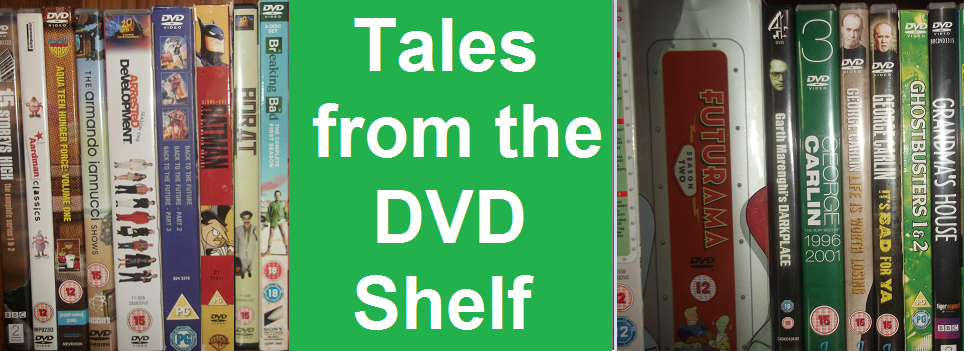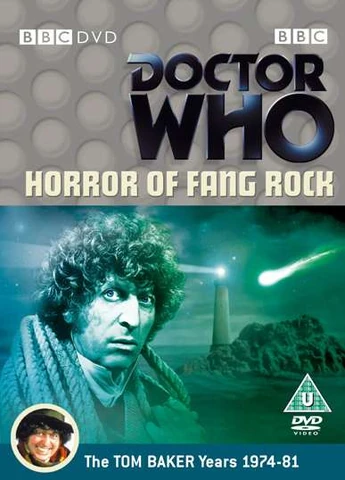I ended up watching this after about 12.00 midnight, and honestly it perhaps is not the best time to watch this, for it is no doubt one of the nastiest and most remorselessly grim and brutal depictions of horror Doctor Who has ever done. The utter relentless sense of foreboding death and misery, that no one will survive the night and there is no way to get away from it creates a fucking horrible sensation. Even the location freaks me out, the sheer utter isolation and claustrophobia, with only one way up and one way down, and if the monster is in the bottom bit your're fucked to get out. It's skin-crawlingly oppressive.
Set on nothing but a lighthouse, the atmosphere is set from the beginning in the water-swept cliffs being battered relentlessly by the waves, the endless fog, and the sound of groaning, moaning, deep swelling noise of the foghorn periodically sounding like some great big monster from the depths of the ocean. And it gets all the more grim from there, as a Rutan crash lands in the nearby sea, and does what it does best - kill everything and get home.
It is quite possibly the most atmospheric, tense and moody pieces of drama Who did. From start to finish the tension involved in the story ramps up to almost unbearable levels, you are hooked watching. The tale of the "beast" of Fang Rock, that supposedly killed three lighthouse men gives the story a kind of terrifying fatalistic edge, a sense that they are doomed just by being there (it's also very odd, just anyway, that three previous lighthouse keepers in the 1820s died in so similar a way as to the events now. It's never explained how they died at all, its presumably not any kind of "beast", and yet the fact that tragedy could strike twice on one island does give it a chilling feel. Perhaps a Rutan came here before even?). The fact that on occasions we are only given a fleeting sight of the monster, crawling up the lighthouse, seen in the distance dragging the corpse of Ben the lighthouse keeper, also gives it a horrible atmosphere. What is it doing? Where is it going? When is it going to strike next?
The characters too were cast to perfection. The old gruff bastard lighkeeper Reuben, moaning about the change to electricity, distrustful of foreigners, his head filled with the ghoulish mythology of the island, is, to an extent, a cliche, and yet it is portrayed so well by Colin Douglas it draws you in irresistibly. He then totally flips that when the Rutan copies his body, becoming an undead hulk stalking the stairs, and my god is he scary. There's one bit in particular, and I swear it's one of the most frightening bits of Who I've ever seen. When the old lighthouse keeper is totally possessed, he tries to smile to the younger guy at one point. And the smile he produces...I mean, it's a grimace more like, but christ, I have never seen a more hideous smile in my life. It's like someone forced fishooks into his mouth to raise them, and his eyes are totally psychotic. Paddy Russell said it scared the willies out of her while he did it, and it did me too. Even the shot of his staring blankly at the bottom of the stairs while the Doctor talks to him creeps me the hell out, the sheer passive blankness while also the notion that he's coming to get you. (shudders). On the other end, the younger-ish keeper, Vince, played by John Abbott, does the opposite, playing country bumkim harmless innocence and sweet filled stupidity, not out for much, just happy light-keeping, is beautifully played, and makes his death all the more sad.
On the other end to both those two is the surprise arrival, mid-way through the story, of our three new characters. They might be the most appalling people to ever appear in a Doctor Who story. James Skinsale, played by Alan Rowe, is probably the nicest of the lot, genuinely helping the Doctor, but is, still fundamentally to his heart and old aristocrat and snob, concerned with his pride more than anything (how utterly fitting, in a kind of fatal flaw that would make Shakespeare smile, that he is killed trying to grasp scattered diamonds into his open paws). Annette Woollett's Adelaide Lessage manages to flip between almost unbearably hysterical and mawkish, endless fits of tears, and a loathsome screaming bully demanding answers from everyone and insulting them when she can't understand it. And last but not least is Lord Palmerdale, played by Sean Caffrey, who is utterly mesmerising in every scene he's in. A throughout odious and loathsome creature, solely obsessed with winning big back in the stock market in London, utterly uncaring to the lives he lost by crashing the boat, threatens his workers and bribes people. He's magnetically disgusting, and therefore very appealing. But this just adds to the sense of hopeless doom that the story builds too, half the characters are too simple and too folksy too know what's going on and half the characters are to venal and callous to care. There's remarkedly few sympathetic characters in this show and it is extremely bold in that regard, Leela and the Doctor really are quite on their own. It gives the whole thing a sense of utter tragedy - no one will live the night.
It is also shot beautifully. It's a real tragedy that at this point in Who's history they start loosing all their greatest directors, the ones who managed to turn Phillip Hincliffe's run on Who into televisual gold (David Malonely, Chirstopher Barry, Douglas Campwell, Michael Bryant, and indeed Paddy Russell, all of whom managed to produce just stunning work despite the limitations they worked in.) She shines in this, as much as she did in Pyramids of Mars too. The mist drenches landscape bathing everything, the impressive CSO glasshouse which doesn't look out of place at all, the shots of Tom silhouetted in the door-frame calling for Ben's name, the pan shots out of the desperate little lighthouse isolated in a literal sea of darkness. It's so utterly doom-inducing it's wonderful.
Also on commendation is Dudley Simpson's score, either in the shots of the lighthouse from a distance or the loud, almost horn like noises processing the Rueben-Rutan clone, are glorious. His work, I think, is actually sorely underestimated (by me especially, I remember not valuing him much at all in years previously) but listen to any of his scores and each one of them is absolutely pitch-perfect for the show, completely conveying the mood appropriate to each show while being interesting pieces of music in their own right (listen to the slow drumbeat music of Brain of Morbius as Morbius arises from his table being finished by Solon, or the Chinoiserie noises in the Talons of Weng-Chiang as Mr. Sin goes to kill his victim in the first episode, or the tension-inducing clacking noises in Pyramids of Mars as Sarah and the Doctor are on the run - and you'll see what I mean).
Leela is excellent in this too. In her stories from The Face of Evil to now she's consistently been one of the most active and dynamic companions they have. She practically leads half the story in The Talons of Weng-Chiang, and here too her literal rolling of the eyes as Adelaide has a faint, her almost giddy enthusiasm at being able to kill the monster, she was a really good companion. Jameson as well managed to always convey in her this sense of being actually, in her own right, extremely intuitive and smart, while not necessarily having any formal logical capacity or argumentation skills herself. It's a subtle and deft piece of acting she accomplishes, whereas it could have easily turned into an almost comic dumb-dumb role. I just feel sorry that she had to do all this while working with Tom Baker.
I also like the monster. Paddy Russell seemed to hate it. I think it looks brilliant, a pulsating, globular, phosphorescent beauty. The shine of it is wonderful, it looks like a living being. The transition effect from Rueben into the Rutan I also think is staggeringly well-done, looks almost seamless. I also think it was a total stroke of genius on Terrance Dick's part to turn it into a Rutan. It transforms it from being simply A Alien for the week into a broader part of the show's mythology and universe, linking things up and making it feel like a broader, truly alive thing. It was equally as genius to turn the Sontaran's mortal enemy into a shape-shifting jellyfish. As Dick's noted, the Sontarans are squat, brutal, unrefined killers - one could draw them using only five squares and one arch. Why not make the Rutans the opposite - ill defined, amorphous. And immediately upon seeing it's kill strategies in this episode one get's a hand on why the war's lasted millenian. The Sontarans grow clones by the million every second, the Rutan are a hive mind race (it calls itself "we" when wounded), dependent on a Rutan Queen (see the Tardis Wiki page for more info). The Sontarans have erased all kinds of individual personality or free will by literally downloading the same fanatical obsession with killing and processing it into every mass produced Sontaran. The Rutan is dependent on a hive mind link with the Queen, meaning they have no individual personality, her thoughts are theres. Both races are incapable of thinking for themselves, both have obliterated individual freedom in different ways. And look at how they fight. There's tons of Sontarans - tons. They just come in and kill. There might not be as many Rutans (although if it's a Queen, she could produce eggs by the millions in huge hatches, so many not so unequal), but they can hide, copy and then kill. You can't stop the Sontarans, and you can't even see the Rutans. The Sontarans will be trying to kill every Rutan they can find while the Rutans are busily infiltrating inside their ranks, killing Sontarans. Which makes the Sontarans produce more Sontarans, which makes Rutans copy more Sontarans and so on ad infinitum. No wonder they still fight.
So the Doctor and Leela leave, with everyone inside dead. What a grim story. It really is remorseless, perhaps grimmer than anything done in the Hinchliffe era (name the number of times in this story the Doctor jokes and laughs, his face is a stony rock throughout, perhaps reflecting the fact that Baker was having a prolonged sulk and hating everything regardless). Even in a bunch of his stories they were frequent moments of brevity. The setting is so unbearably isolating and claustrophobic it's actually uncomfortable. There's only one way up, and one way down, and if the monster is coming up - you're fucked. Another thing that creeped me about this episode was thinking about aftermath. Imagine finding this light house, completely abandoned, everything where it should have been, with two bodies of lightkeepers missing, one dead and four other dead, with the hole light blow apart. What the hell could you gather from this scene of chaos? Imagine the feeling on unknowable terror for the people who encounter this island. That made it even more sinister to me. It is for that one reason and enormously chilling piece, and one that quite genuinely stayed with me long after I finished watching it.
9/10


No comments:
Post a Comment